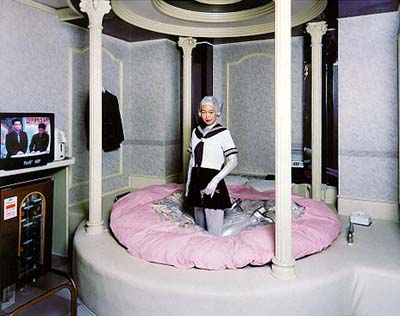
I tutor a group of men in their late 30's once a week. Last week, however, I was the one who received the lesson.
When I arrived for the lesson, I pulled back the clear plastic sheeting that hangs over the entrance to the garage, entered, and bowed. I took a seat on my plastic white lawn chair in the small arc of chairs around the kerosene heater. I said my hellos.
To my left sat a man who once pursued a professional boxing career as a middleweight, a man with glasses, strong teeth, and a cockiness born not only from his size but his decent command of the English language in a country that idolizes everything English. To my right sat a jovial, bespectacled, family man with eyes that disappear into his smiles and a modesty that reigns over his wardrobe, his questions in class, and his gentle handshakes. Across from me, slouched back in his chair, sat a man who actually enjoys winter surfing, a man who speaks while sporting a perpetual grin on his face like The Joker from Batman.
We started our small talk--
How was your week? Any plans for the weekend? We usually chat for 30--40 minutes before making our way upstairs to start the "formal" lesson. Often, the conversation pings from us like pin balls from the flippers and time flies. This night was no different.
Before what I swore was no more than an instant, the ex-boxer was talking about love hotels, the fascinating, neon-pulsing establishments that let Japanese couples escape their domestic digs for an hour (or a full night) of lusty lovey-dovey. Usually, these hotels have mirrored walls, vibrating beds, TVs with a single channel that always moans, and enough prophylactics and lubricants to allow a baby calf to re-enter its mother's mommy cave should he choose to hide from a veal farmer.

"I love love hotels," he declared.
I love the way that sentence sounds, I thought.
"Why do you like them so much?" I asked.
"They are cheap!! Ice and Cream off Rt. 18 only costs 5,000 yen (about $45) for one room per night! Also, they are fun." He said this matter-of-factly and then unrolled a big grin. The winter surfer laughed. The ex-boxer leaned in closer to the heater and the rest of us. He continued.
"And, they are good for many girlfriends!" He leaned back, and, satisfied, he folded his arms across his chest like he just pulled a difficult block from a Jenga tower without collapse. I became more interested in the conversation--the air of relaxation in the room, around the heater, was now palpable and I could tell the men wanted to open up and talk, wanted spill beans that rarely, if ever, get to be spilled.
"Go on!" I urged. "You can't just say something like that and stop!"
"Well, I live with my family so I never have girlfriend to my house. But...even if I live alone, I still will go to love hotels! Because if I have a girlfriend to my house, I can only have one girlfriend. I don't like this. With a hotel, I can meet different girls when I want."
"Four? Five? Seven?" The winter surfer practiced his counting and contributed to the conversation at the same time--moments like this inspired him to keep coming to English class each week. The family man chuckled.
"Well, a few. Four now, I think. Sometimes, I change girlfriend. I like different types of girlfriend. For example, young girlfriend, old girlfriend, and sometimes married girlfriend!"
We all started howling.
I felt a little guilty laughing and I couldn't help but think of the husbands, out there somewhere, who kiss their wives and detect faint scents of another man, of this man sat before me, on the clothes of their spouses, on the headrests of their cars, on their pillow cases.
"Last year, for example, I had two girlfriend in Toyoshina. One girl was a high school student, 18-years-old, and one girl was a woman, 47-years-old."

At this point, my jaw was on the ground seeing as I teach high school students and couldn't possibly imagine any of my students peeling their little faces away from their textbooks long enough to utter a single "Konnichiwa" to the stocky ex-boxer. I also wondered if this man had just confessed to committing some sort of crime. Again, the man leaned in close to the heater and started speaking with a whisper as if the walls have ears.
"Oh, Andrew, I have a question. The 47-years-old woman, she used to meet me in a parking lot in Saku. She used to...uhhh...I don't know in English." He starts gesturing with his hand near his crotch. "She gives a...uhhh... handshake?"
We all laughed--I because I knew he made a mistake with his English, the other two men because he gestured with his hand near his crotch.

"No no no!! Not handshake! This is handshake!" We shook hands. "In English we call this," I imitated his gestures, "We call this a 'hand job'." Before I could finish digesting this thought--
I am, at this moment, getting paid to teach the difference between a hand job and a handshake to three grown men sitting around a heater in a cold garage in Japan--the ex-boxer continued.
"And what do you call a mouth...a kind of mouthshake?" He gestured with his hand, opened his mouth like he was going to scream, and bobbed his head back and forth. The other two men erupted with laughter. "A mouth job?"
"Hahaha. No, not really. We call that a 'blow job' in English. 'Blow. Job'."
"Ah ha! Blow, like a wind blow? Ah ha! Blow job, hand job! Blow job, hand job." The two other men repeated after him and practiced their pronunciation like new converts learning from a proselytizing adult film star.





 Various graduation pics.
Various graduation pics.



















